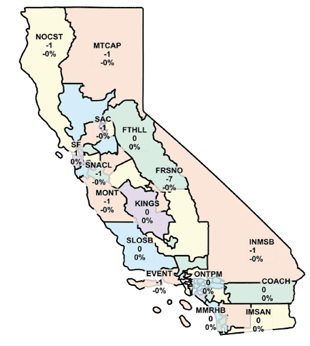Redistricting Journal: California poised to be nation's hottest House battlefield
Mark Gersh is Washington Director of the National Committee for an Effective Congress, and a CBS News Consultant. This is a regular Hotsheet series on redistricting battles across the country.
The stakes are high in California: it holds more congressional districts than any other state, and unlike many states where elected officials (and hence, the party in power) controls drawing the lines, California has tried to remove strict partisanship from the process with an independent and bipartisan commission drawing the new boundaries.
Now, the first of three map proposals that will be finalized later this year is out, and the California redistricting commission signaled that the days of incumbent protection are over.
This new map (at left) would propel Democratic prospects and force numerous incumbents into the same district, where they may end up competing against each other. And in a state that saw no districts change hands in 2010, California could now be poised to become the nation's hottest House battlefield in 2012.
Right now, Democrats hold 33 of the state's 53 congressional districts (and widely expected to return to 34 after a special election in CA36 this summer).
An initial assessment of the likely partisan ramifications, assuming the first proposal replicates the final version, is that 29 seats are certain to elect a Democrat, and 12 a Republican. Twelve seats would be competitive, seven where is the outcome is impossible to predict, four lean Democrat and one leans Republican. Consequently, Democrats should win at least 33 and as many as 41 of the 53 seats. If the toss-ups are split evenly, Democrats would win 36-37 of the 53 districts, a net gain of 2-3 seats.
Democratic incumbents facing serious general election challenges include notable names Lois Capps, Dennis Cardoza, Jim Costa and Loretta Sanchez, and possibly Susan Davis. Republicans who may lose a seat to a Democratic challenger include Brian Bilbray, Elton Gallegly, David Dreier (who was drawn into a heavily Hispanic Los Angeles district), Gary Miller, Dan Lungren, Jeff Denam and possibly Mary Bono Mack.
Also animating the California electoral environment are potential primary showdowns. For example, two long-term Los Angeles area Democrats, Brad Sherman and Howard Berman, were drawn in the same district. Although Democrats Pete Stark and Jerry McNerney were forced into a shared district, McNerney may move east where a sizable segment of his current district is encompassed.
Similarly, Republicans Brian Bilbray and Darrell Issa saw their districts combined, with Bilbray contemplating the option of running in a neighboring and more Democratic district in the San Diego area. In another fascinating decision, all three Central Valley incumbents -Republican Jeff Denham and Democrats Dennis Cardoza and Jim Costa - were merged into one district, although each may opt for a neighboring district.
The redistricting commission went to great lengths to bolster minority representation, reflecting the state's changing demographics. It created 16 majority Hispanic districts, and two others with Asian populations in excess of 40 percent. The residual impact may be primaries between African American and Hispanic candidates. African-American incumbent Laura Richardson may faces a serious challenge from a Hispanic candidate in the Democratic primary. Judy Chu, an Asian-American Democrat, will be able to run in a district that is 49 percent Asian, thus avoiding a serious primary fight against a Hispanic challenger.
From a geographic viewpoint, the map may reflect overall growth in population moving east of Los Angeles County, which would surrender a district to the Inland Empire (San Bernadino-Riverside), and the Central Valley garners an increasing influence over the Bay area.
The evolving redistricting process calls for approval by August 15th by a 14 member citizens commission. It will require an affirmative vote from 9 of 14 commissioners. Overall, the commission consists of five Democrats, five Republicans and four members unaffiliated with either party.
California failed to gain additional congressional seats for the first time in history. Given the absence of competitive congressional races in recent years (no seats changed hands in 2010, and only two were ever in doubt), the parties didn't need to spend large allocations of national party money in the expensive California media markets. That will change in 2012, when California will potentially be the scene of more marginal congressional races than any other state in the country.
More Redistricting Coverage in Hotsheet:
Iowa races could be among 2012's most competitive
Indiana redistricting bolsters GOP prospects
Dems seek big gains after Illinois redistricting
